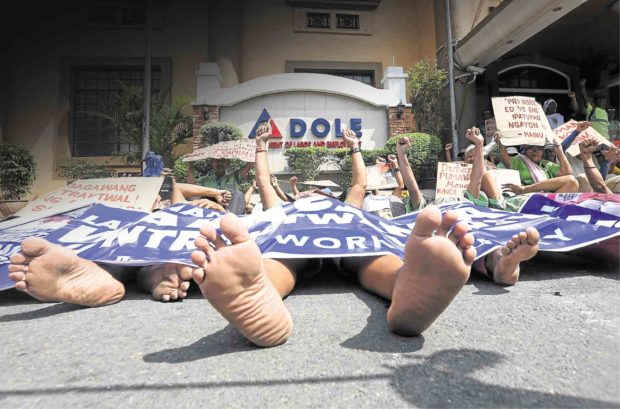
END CONTRACTUALIZATION Protesting workers press President Duterte to sign the executive order ending the practice of labor contracting in front of the Department of Labor and Employment main office in Manila on Monday. —MARIANNE BERMUDEZ
Labor groups could expect a proworker executive order (EO) on contractualization from President Rodrigo Duterte on or before May 1, Labor Day, his spokesperson, Harry Roque, said on Monday.
“The President wants it as soon as possible,” Roque said.
The groups had expected the President to sign the much-awaited directive ending the practice of “endo” at a meeting with them on Monday, but Malacañang canceled the meeting.
“Endo,” or end of contract, refers to a contractualization scheme that offers short-term and unprotected temporary work arrangements.
The draft EO proposed by the labor groups provides that the direct hiring of employees will be the general norm in employment relations.
The draft EO also states that the prohibition is not absolute and that the labor secretary, in consultation with the Tripartite Industrial Peace Council, may determine activities that may be contracted out.
Roque surmised that the meeting between the President and the labor groups was canceled because the workers, management and the government had yet to agree on the final version of the EO.
But he stressed that the signing of the EO was a priority of Mr. Duterte.
“I know that the President is rather restive about this EO. He has mentioned to me personally that this is a campaign promise that he wants to deliver to the people very soon,” Roque said in a press briefing.
He said the order would be in the workers’ favor. “I would suppose, because it is a promise given by the President to labor groups, that it would be an EO that would side with the labor forces.”
Disappointed
Labor groups expressed disappointment over the aborted meeting with Mr. Duterte and urged him to state his true position on contractualization.
“The end game on ‘endo’ is supposed to be in its final stages, but the momentum is held back by political indecision on the part of the Chief Executive,” said the Nagkaisa labor coalition.
Endo workers are bound by a five-month contract so that companies will not make them regular employees after six months as mandated by the Labor Code.
Momentum halted
For Partido Manggagawa chair Renato Magtubo, the decision to cancel the meeting in Malacañang halted the momentum against endo and other contracting practices.
“By deciding to cancel and opting not to sign the labor version of the said executive order, the President is actually pressing the stop button of the momentum against endo,” Magtubo said.
The Federation of Free Workers (FFW) reminded Mr. Duterte to keep his campaign promise to end contractualization.
“We consider the postponement as a setback. If the version to be signed is not of the workers, and but a rehash of the Department of Trade and Industry and employers’ version that will legitimize agency hiring and worsen the plight of workers, then it better be left for dead,” said FFW vice president Julius Cainglet.
URGENT CALL A worker calls for an immediate end to labor contractualization during a protest rally in front of the Department of Labor and Employment building in Intramuros, Manila. —MARIANNE BERMUDEZ
Alan Tanjusay, spokesperson for the Associated Labor Unions-Trade Union Congress of the Philippines (ALU-TUCP), said vested interests were preventing the President from signing the labor groups’ draft of the directive.
Legislation
“We don’t know if the President himself postponed the meeting, but we have some basis to say that the powerful business groups close to Mr. Duterte are keeping him from signing it,” Tanjusay said.
Before his appointment as justice secretary, then Senior Deputy Executive Secretary Menardo Guevarra said an EO from Malacañang could not completely ban contractualization, pointing out that this would need legislation, particularly the amendment of the Labor Code.
But Guevarra said the EO could provide for the strict implementation of labor laws and put in place more safeguards for the workers.
He also said this did not mean that Mr. Duterte had turned his back on his promise to end contractualization.
Malacañang could coordinate with Congress for the passage of a law that would end the unfair labor practice, he added.
In February, Mr. Duterte said a compromise might be needed to deal with contractualization.
He noted that he could not force private companies to accept workers they do not like. —Reports from Leila B. Salaveria and Julie M. Aurelio